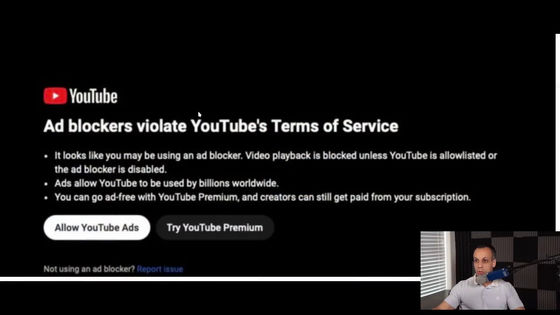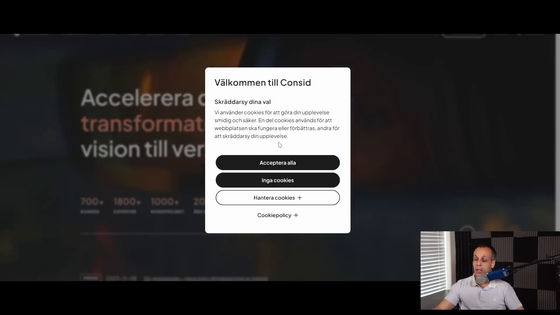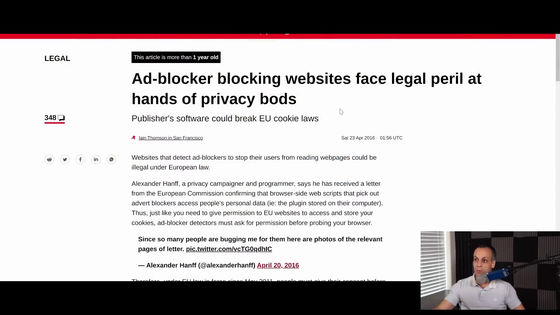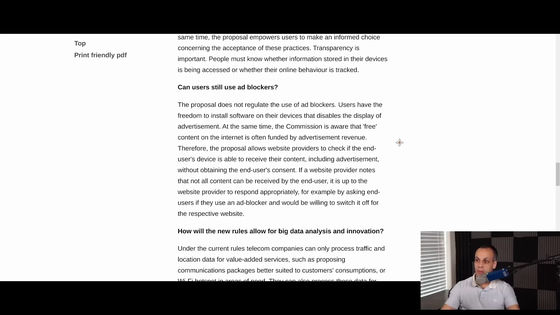Pointed out that YouTube's ad blocker detection function violates EU law

Since YouTube operates based on advertising revenue, we are taking
Youtube's AdBlock detection might break the law in the EU - YouTube
YouTube is tightening its crackdown on ad blockers , and if you use YouTube with an ad blocker in place, the following message will be displayed. This is a notification that detects ad blockers and warns you that you are violating YouTube's terms. However, if YouTube is registered in the ad blocker's ad permission list, that is, if the ad block function is disabled, you can play videos on YouTube without any problems.

Privacy activist Alexander Hanff points out that the ad blocker detection script used by YouTube is ``a violation of EU directives.'' This is because YouTube detects software running on your computer without your consent.

Mr. Hanff began making this claim around April 2016. At the time, Mr. Hanf was researching websites that could detect whether an ad blocker was installed, and from there he started paying attention to YouTube's ad blocker detection function.
Since then, Mr. Hanff has pointed out that YouTube's ad blocker detection function is ``an invasion of privacy.'' According to Hanf, Article 5.3 of the EU's ePrivacy Directive states that ``clear and comprehensive information must be provided to access information stored on a subscriber's or user's device. Permission is granted only with the consent of the person concerned.'' Hanff claims that YouTube violates the e-Privacy Directive.
In response, YouTube continues to detect ad blockers as ``violating the terms of service.'' YouTube claims, ``If you are using a Google account, you should have agreed to the terms of service somewhere in the account creation process.'' However, YouTube allows you to play videos without a Google account. In this case, even if you do not agree to the terms of service, YouTube will automatically inspect your device to detect ad blockers.
The code that detects whether an ad blocker is running on your PC is very similar to technologies that can lead to collecting your personal information, such as third-party cookies. In other words, Hanff points out that YouTube's ad blocker detection function is in a very similar situation to third-party cookies.

Mr. Hanff calls YouTube's ad blocker detection function 'spyware' and says, 'There is no other way to describe it.' Hanff also pointed out that technologies that detect what is running on a device are unethical and illegal in most situations.
There are multiple websites that detect whether you have an ad blocker installed, and some websites that ``detect an ad blocker and prevent you from viewing content until you disable the ad blocker''. Whether these types of anti-ad blocker websites are illegal or not 'depends on how you do it,' Rossmann points out.

One way to detect ad blockers on a website is to look at what the user's device is loading in the server logs. For example, if there is a website that has content A, B, C, D, E, F, and there is a device that does not consistently load F, this device will somehow load content F. You can think of it as preventing it from loading. If this F is an advertisement, we can infer that an ad blocker is installed on the device. With this method, the website simply checks the server logs for content read by the IP address, so you might think, ``I don't think we'll need user consent for this.'' 'It's like checking on people walking by your house or coming to your front door,' Rossmann said.

On the other hand, Rossmann points out that if a code such as JavaScript is executed on a user's device without the user's consent and an ad blocker is detected, that is ``crossing the line.'' According to an article in The New York Times, some websites download JavaScript code to users' devices without permission to detect ad blockers, and this type of website may be in violation of the law. It is pointed out that there is.

The website of the European Commission (EC), the EU's policy enforcement agency, added a section on ad blocking on January 10, 2017. This section states: ``The EC recognizes that free content on the Internet is often financed by advertising revenue. Therefore, this proposal would allow website providers to ensure that end-user devices receive content that includes advertising.'' 'We are permitted to check whether the end user is using the product without their consent.'

Rossmann said: ``Honestly, I'm not a lawyer so I don't know the details, but when I check the various EU laws, they seem to be directly contradictory. 'The upshot of this ad blocker detection feature is that it's not going to be a solution that everyone will like. It's probably going to be something like a cookie notification.'
Rossmann points out that the only way for YouTube to comply with EU law is to display something like a consent notice regarding the use of cookies. 'Google and YouTube sometimes send legal notices to specific people and companies, but I think it's likely that they themselves are breaking the law in the first place.' 'If you look at the server logs, I don't think it's against the law if there's a way to infer whether a user is using an ad blocker by simply running some code on the user's computer to detect the ad blocker. If so, I think it would be a violation of the law because it would be done without the user's consent.'
Related Posts:
in Video, Software, Web Service, Posted by logu_ii






